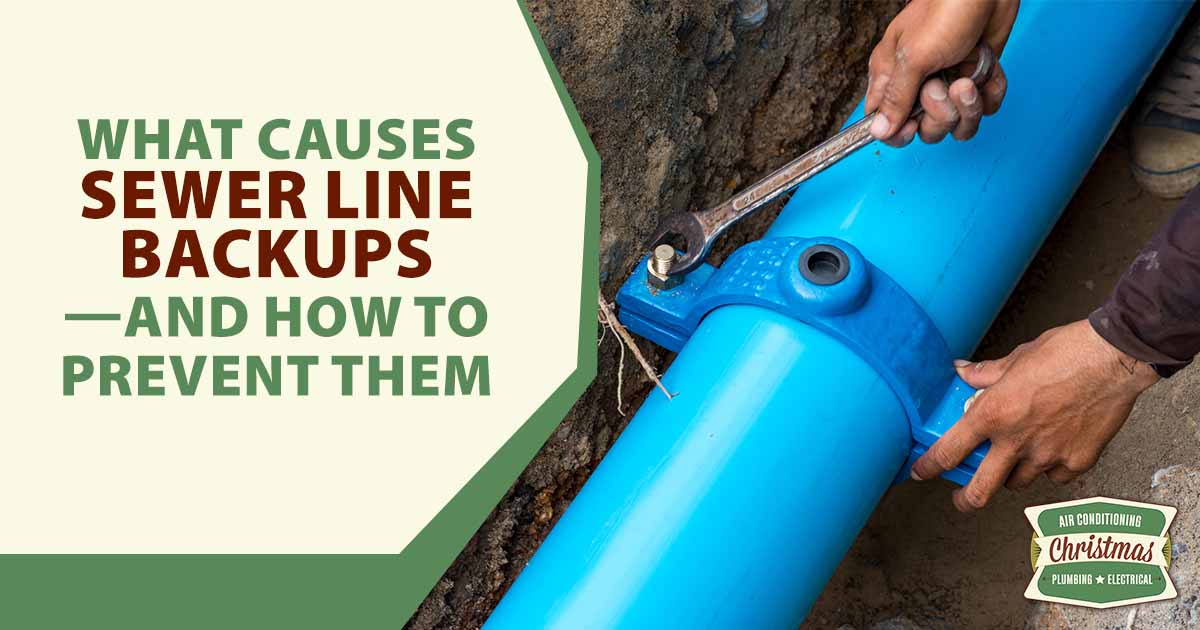Homeowners in Denton and the Dallas–Fort Worth area frequently encounter recurring plumbing issues resulting from sewer line backups. When left unaddressed, these issues can result in costly repairs, health risks, and property damage. Understanding what causes backups and how to prevent them is essential for long-term plumbing system performance. For those already experiencing issues, professional help is available at Christmas Air Conditioning’s Sewer Line Cleaning and Repair Services.
Common Signs of a Sewer Line Backup
Early detection of a sewer backup can help prevent significant damage. Below are the most common signs homeowners should watch for:
- Slow drains: If multiple drains in the home are draining slowly, it could indicate a clog in the main sewer line rather than an isolated blockage.
- Gurgling noises: Unusual sounds coming from toilets or drains suggest air is trapped due to a blockage in the sewer system.
- Unpleasant odors: A persistent sewer smell in bathrooms, kitchens, or around floor drains may signal a backup or damaged pipe.
- Water backup, where water rises from floor drains, showers, or tubs when toilets are flushed, indicates a potential obstruction in the central line.
- Frequent clogs: If plunging or drain cleaning is needed more often than usual, the issue may stem from a deeper blockage in the sewer line.
Recognizing these early warning signs can help Denton and DFW homeowners address sewer line issues before they lead to a plumbing emergency.
What Causes Sewer Line Backups?
Understanding the root causes of a sewer line backup is key to preventing future plumbing issues. In many homes throughout Denton and the Dallas–Fort Worth area, backups are caused by a combination of aging infrastructure, poor disposal habits, and environmental factors. Below are the most common contributors to main sewer line problems.
Tree Root Infiltration in Sewer Pipes
One of the most common causes of sewer line damage is the intrusion of tree roots. In older neighborhoods, large trees often have root systems that grow toward underground moisture—making cracked or weakened sewer pipes a target. Once roots enter the line through small openings, they can expand inside the pipe and block or break it.
This is especially common in Denton homes with clay or cast-iron pipes, which are more prone to cracking over time. Homeowners may notice slow drains, backups in lower-level bathrooms, or gurgling sounds as early symptoms of root invasion.
Grease, Fat, and Food Waste Buildup
Pouring cooking grease, oils, or food waste down the kitchen sink can lead to serious clogs over time. While these substances may be disposed of in liquid form, they solidify as they cool, adhering to the interior of the pipes. As buildup accumulates, it restricts water flow, leading to backups.
Regularly disposing of grease in the trash and avoiding food waste in sinks—especially starchy items like rice or pasta—can help prevent this common cause of sewer line blockages.
Flushing Non-Flushable Items
Toilets are only designed to handle human waste and toilet paper. Flushing wipes (even those labeled “flushable”), paper towels, feminine hygiene products, or cotton swabs can cause obstructions in the main sewer line. Over time, these materials accumulate and restrict the flow, increasing the likelihood of a sewage backup.
Educating household members about what should and shouldn’t be flushed is a simple way to reduce the risk of plumbing issues.
Collapsed, Bellied, or Damaged Sewer Pipes
Homes with older sewer systems, particularly those built before the 1980s, may have pipes that have collapsed, sagged (bellied), or deteriorated. Shifting soil, frequent freeze-thaw cycles, and heavy vehicle traffic above buried lines can also damage pipes over time.
A collapsed sewer line often results in recurring backups and may require a complete pipe replacement, especially if the damage is extensive or located beneath the home’s foundation.
Heavy Rainfall and Ground Saturation
Severe storms and flash flooding are common across the DFW area. When municipal systems become overwhelmed during periods of heavy rainfall, excess water can back up into residential lines. Homes without proper sewer backflow prevention may experience wastewater entering through floor drains or lower-level plumbing fixtures.
Although weather-related backups are sometimes beyond a homeowner’s control, preventive measures such as backflow valves and proper drainage grading around the home can help minimize the risk.
How to Prevent Sewer Line Backups
Taking proactive steps can significantly reduce the risk of a sewer line backup in homes in Denton and the Dallas–Fort Worth area. Preventive measures range from simple at-home habits to scheduled professional services. Here are the most effective ways to protect your plumbing system.
Schedule Routine Sewer Line Inspections
Regular inspections by a licensed plumber are one of the best ways to detect issues early. Using camera equipment, professionals can identify root intrusion, pipe corrosion, blockages, or bellies in the line before a full backup occurs.
For homes with older plumbing systems or those located near large trees, an annual sewer line inspection is highly recommended. Early detection often allows for a less costly and less invasive repair.
Use Drain Strainers and Grease Traps
Installing simple tools, such as drain strainers in sinks, tubs, and showers, helps catch debris before it enters the sewer system. For kitchen sinks, grease traps or containers for disposing of cooking oils can prevent buildup in pipes.
While small, these devices provide a significant first line of defense against blockages caused by hair, food waste, and other debris.
Proper Disposal Habits at Home
Educating family members on proper disposal is crucial to maintaining a clear sewer line. This includes:
- Avoiding flushing anything other than human waste and toilet paper
- Pouring grease and oil into containers instead of the sink
- Keeping coffee grounds, eggshells, and fibrous vegetables out of the disposal
Simple behavioral changes can make a long-term impact on sewer line health.
Invest in Professional Sewer Line Cleaning
Even when there are no apparent signs of a clog, routine cleaning can help keep sewer lines flowing smoothly. Hydrojetting uses high-pressure water to clear grease, roots, and sediment without damaging pipes.
Professional cleaning is especially beneficial for homes with recurring slow drains or a history of previous backup incidents. Scheduling this service every 1–2 years helps avoid unexpected plumbing emergencies.
Install a Sewer Backflow Valve
A sewer backflow valve prevents wastewater from re-entering the home during times of municipal overflow or flooding. It acts as a one-way gate that shuts automatically if water attempts to flow in the wrong direction.
These valves are recommended for homes with basements, floor drains, or low-level plumbing. Installation by a licensed plumber ensures the device functions properly and complies with local codes.
The Importance of Timely Sewer Line Repair
Ignoring a sewer line backup or delaying necessary repairs can lead to severe consequences for both a home’s structure and the health of its occupants. Addressing the issue promptly ensures minimal disruption, lower costs, and long-term plumbing reliability.
Health and Safety Risks
Backed-up sewage contains harmful bacteria and contaminants that pose significant health hazards. Prolonged exposure can lead to mold growth, respiratory issues, and unsanitary living conditions. Any signs of sewage backup—especially standing water or foul odors—should be addressed by a licensed and reliable plumber as soon as possible.
Structural and Property Damage
Sewer water can damage flooring, drywall, and the home’s foundation if not removed quickly. The longer wastewater remains in the house, the greater the risk of permanent damage and high repair costs. Even small leaks from a damaged sewer line beneath the foundation can cause slab shifting or cracks over time.
Increased Repair Costs Over Time
Delaying repairs often turns a manageable plumbing issue into a more expensive one. What might start as a partial blockage could eventually become a full collapse, requiring excavation or full line replacement. Early intervention with professional sewer line cleaning or targeted repairs can save thousands in future restoration costs.
When Replacement Becomes Necessary
In cases where a sewer line is severely corroded, repeatedly clogged or collapsed, replacement may be the most cost-effective option. Modern trenchless technologies, such as pipe lining or pipe bursting, allow professionals to restore functionality with minimal disruption to the yard or foundation.
Working with a plumbing service familiar with Denton and DFW-area infrastructure ensures proper permitting, inspection, and code-compliant installation.
Need Help with a Sewer Line Backup? Contact Christmas Air Conditioning & Plumbing Today
Don’t wait for a minor clog to become a major emergency. If you’re experiencing signs of a sewer line backup or want to schedule preventive maintenance in Denton or the DFW area, contact the trusted plumbing experts at Christmas Air Conditioning & Plumbing.

